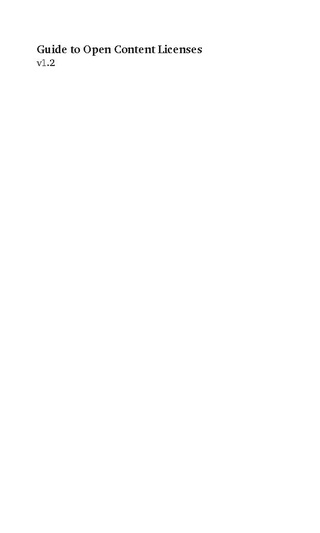Open licenses: Difference between revisions
(→Guides) |
(→Guides) |
||
| Line 23: | Line 23: | ||
= Guides = | = Guides = | ||
A Guide to Open Content Licenses was written in 2004, revised in 2005 by Lawrence Liang as part of the early Piet Zwart Institute Research program (at the start of the Media Design course). | |||
It's dated, but a useful document. | |||
[[File:OpenContentLicenses v1.2.pdf|320px]] | [[File:OpenContentLicenses v1.2.pdf|320px]] | ||
Also referenced here: https://monoskop.org/Lawrence_Liang | Also referenced here: https://monoskop.org/Lawrence_Liang | ||
Revision as of 21:58, 15 March 2022
'A beginning of a future library with licenses that are interesting and useful for XPUB's publications.
CC4r
About
Copyleft Attitude with a difference - version 1.0
The CC4r considers authorship to be part of a collective cultural effort and rejects authorship as ownership derived from individual genius. This means to recognise that it is situated in social and historical conditions and that there may be reasons to refrain from release and re-use. The CC4r articulates conditions for re-using authored materials. It is inspired by the principles of Free Culture – with a few differences. The readers are invited to copy, distribute, and transform the materials published under these conditions, and to take the implications of (re-)use into account.
The full license information is published here and this is the link to add when using this license for your publication.
Usage
tba
Publications under this license
Free Art License
About
The Free Art License grants the right to freely copy, distribute, and transform creative works without infringing the author’s rights. This license intends to allow the use of a work’s resources; to establish new conditions for creating in order to increase creation opportunities. The Free Art License grants the right to use a work, and acknowledges the right holder’s and the user’s rights and responsibility. The main rationale for this Free Art License is to promote and protect these creations of the human mind according to the principles of copyleft: freedom to use, copy, distribute, transform, and prohibition of exclusive appropriation.
The full license information is published here and this is the link to add when using this license for your publication.
Usage
Guides
A Guide to Open Content Licenses was written in 2004, revised in 2005 by Lawrence Liang as part of the early Piet Zwart Institute Research program (at the start of the Media Design course). It's dated, but a useful document.
Also referenced here: https://monoskop.org/Lawrence_Liang

